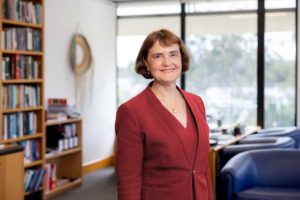Griffith University ranked second overall in Queensland in the United Nations Sustainable Development Goals (UN SDGs) Times Higher Education (THE) Impact Rankings 2023 and ranked 72 overall, out of 1591 institutions globally, highlighting Griffith’s commitment to the values of sustainable development.

Dean of Griffith’s Sustainable Development Goals Performance, Associate Professor Jennifer Boddy.
The 17 UN SDGs provide a framework for tackling climate change, providing health and education for all, eradicating inequality and oppression, and supporting sustainable economic growth.
Dean of Griffith’s Sustainable Development Goals Performance Associate Professor Jennifer Boddy said the SDGs provide a sense of common purpose throughout the university.
“This is an excellent outcome particularly considering the number of institutions participating this year has risen from 1,410 in 2022 to 1,591 in 2023,” Associate Professor Boddy said.
“Thank you to all staff and students who have supported social, environmental, and economic sustainability initiatives and research at Griffith this year.

Griffith Vice Chancellor and President Professor Carolyn Evans.
“It is only by working together that we can achieve the 2030 SDG Agenda and we hope the work featured here inspires the collaborative efforts we need for a sustainable future for all.”
Vice Chancellor and President Professor Carolyn Evans said ambitious action for a sustainable future has never been more necessary.
“I commend all staff and students from across the University who continue to make Griffith proud of its reputation for sustainability impact and leadership.
“Griffith’s Strategic Plan: Creating a future for all 2020-2025, calls for the UN SDGs to be used as the framework for guiding efforts and measuring impact in alignment with our four main values: First Peoples, environmental sustainability, diversity and inclusion and social justice.
“These values guide our commitments and actions as a sustainable, futures-focused organisation driven to achieve positive impact.
“Our researchers are driving world class outcomes through our innovative centres and beacons including the Climate Action Beacon, Disrupting Violence Beacon and Inclusive Futures: Reimagining Disability.”
Griffith’s sustainability impact ranking in detail:
- Promoting partnerships for the goals (SDG #17), Griffith ranked 1st in Queenlsland, 8 in Australia and 54 out of 1625 institutions worldwide.
- Promoting peaceful and inclusive societies (SDG #16), Griffith Ranked 1 in Queensland, 2 in Australia and 19 out of 910 institutions worldwide.
- Promoting good health and wellbeing (SDG #3), Griffith ranked 2 in Queensland, 7 in Australia and 27 out of 1218 institutions worldwide.
- Promoting decent work and economic growth (SDG #8), Griffith ranked 3 in Queensland, 11 in Australia and 61 out of 960 institutions worldwide.
A few highlights which contribute to Griffith’s sustainability impact include:

Photo by Nery Zarate on Unsplash
Fighting the youth vaping pandemic, the Blurred Minds Academy was established by Social Marketing @ Griffith and features eleven evidence-based and gamified modules to support teachers in delivering alcohol and drug education. SDG #3 Good health and wellbeing

Griffith University launched Disrupting Violence Beacon offering solutions to violence with an innovative breadth of multi-disciplinary research responding to issues of justice, risk prevention, building security and breaking cycles of violence. SDG #5 Gender Equality
Griffith-led research from the Australian Rivers Institute has shown constructed wetlands commonly used in wastewater and stormwater treatment systems are also successful filters for microplastics and could prevent microplastics from spreading downstream and contamination rivers and oceans. SDG #6 Clean Water and Sanitation

Sorella’s Story is a 360-degree movie experience allowing the viewer to follow the first-person account of Sorella by wearing a virtual reality goggles. The project was inspired by an historical investigation and directly challenges war, injustice and historical atrocities, promoting peace and justice through empathy and human connection. SDG #16 Peace, Justice and strong institutions.
Griffith University joined the war on waste with its Repair Cafés which aims to encourage people to give new life to their broken or damaged belongings rather than prematurely sending them to landfill or e-waste recycling. SDG #12 Responsible Consumption and Production










